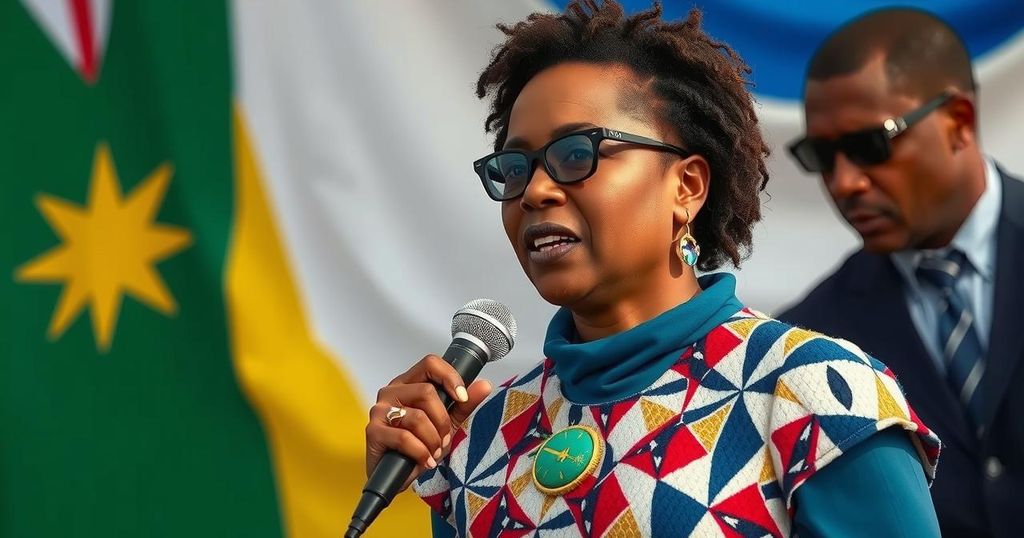Namibia Poised to Elect First Female President in Historic Elections
Namibia’s Vice President Netumbo Nandi-Ndaitwah may become the country’s first female president in the upcoming elections, decisively engaging around 1.4 million registered voters. Despite SWAPO’s long-standing governance since independence, recent corruption scandals and a loss of legislative majority raise questions about the party’s future. With ambitious job creation promises and a focus on women’s issues, Nandi-Ndaitwah aims to address discontent among younger voters amidst rising competition from new political parties. This election reflects broader political shifts within southern Africa’s landscapes.
Namibia stands at a significant historical moment as it prepares to potentially elect its first female president during elections scheduled for Wednesday. Netumbo Nandi-Ndaitwah, the current Vice President, is anticipated to lead in the presidential race, backed by her party, the South West Africa People’s Organization (SWAPO). Approximately 1.4 million Namibians, about half of the electorate, have registered to participate in this pivotal election, which includes 15 political parties vying for both presidential and National Assembly seats.
SWAPO, in power since Namibia’s independence from apartheid South Africa in 1990, has faced challenges, notably losing its two-thirds majority in the National Assembly in 2019. This decline has been linked to corruption allegations and scandals within the fishing industry, impacting public perception and trust. Political analyst Henning Melber emphasizes the necessity for SWAPO and Nandi-Ndaitwah to engage younger voters who may not relate to the party’s historical context. He observes, “The process of erosion of legitimacy as a former liberation movement has advanced too much.”
At the age of 72, Nandi-Ndaitwah’s campaign focuses on vital issues such as job creation, addressing the significant unemployment rate—particularly among the youth—and improving women’s rights, including health care and equal pay. Her ambitious goal includes an investment of approximately 85 billion Namibian dollars over five years to generate over 500,000 jobs; however, critics challenge the feasibility of these promises. Despite SWAPO’s focus on these vital issues, they face competition from parties like the Independent Patriots for Change and the Affirmative Repositioning party, suggesting a shifting political landscape in Namibia.
Current political trends across southern Africa, where traditional ruling parties are experiencing significant changes, such as the ANC’s loss of parliamentary majority in South Africa, indicate a potential for transformation in Namibia’s political dynamics through these elections. As the candidates finalize their campaigns, a crucial moment awaits that could redefine leadership in Namibia and commendably place the nation among those embracing female leadership in governance.
The context of this election extends beyond Namibia’s local politics and reflects broader trends across southern Africa. It marks the first electoral race in Namibia where a female candidate is poised to take the presidency, reflecting a shift towards more inclusive representation in leadership roles. Notably, SWAPO, previously dominant, faces increasing competition from newer political movements amid accusations of governance failures. The historic nature of this election parallels other recent significant political changes within the region, highlighting a common desire for responsive governance and accountability in the face of changing voter demographics, particularly among young citizens who prioritize policy over historical allegiances.
The upcoming election in Namibia is critical as it may see the election of the nation’s first female president, Netumbo Nandi-Ndaitwah. While her party, SWAPO, has a history of governance following the country’s liberation, recent electoral trends reveal a waning dominance and the need to address corruption allegations and engage with younger voters. The outcome of this election could significantly influence Namibia’s political landscape and set a precedent for female leadership in African politics, encouraging discussions around economic and social policies that prioritize inclusivity and accountability.
Original Source: abcnews.go.com




Post Comment